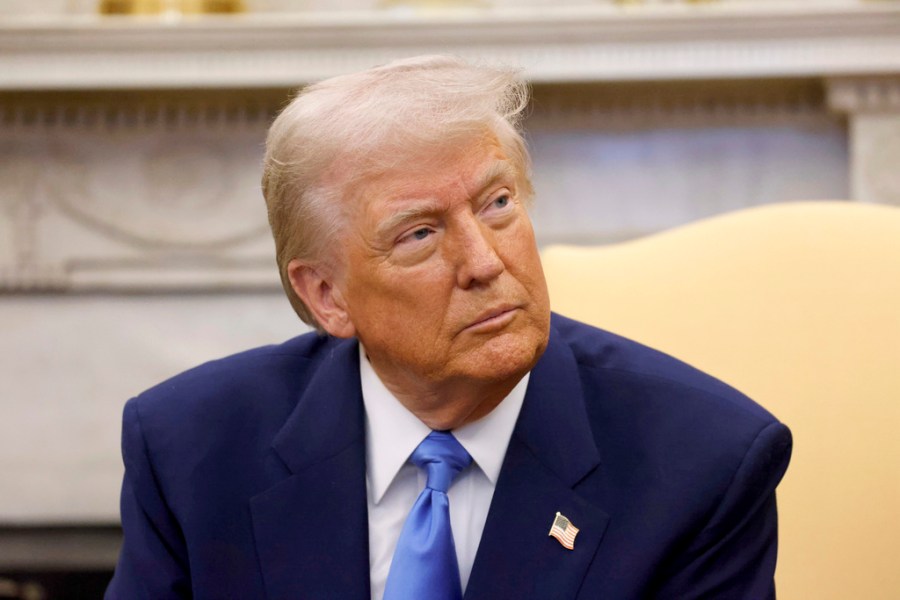
Last week, President Trump told a series of outrageous lies about Ukraine — that it started its war with Russia (Russia actually invaded Ukraine), that Ukrainian President Volodymyr Zelensky is a dictator (not Russian strongman Vladimir Putin) whose approval rating stood at 4 percent (it’s over 50 percent, which is higher than Trump’s rating).
Trump also said battlefield photographs of the war in the Ukraine reminded him of the Battle of Gettysburg. “It’s soldiers lying all over the field, body parts all over the field,” Trump observed. “It’s a horrible thing.”
We can all agree on that one: War is hell. But Gettysburg has also been a symbol of America’s commitments to freedom and democracy, thanks to the immortal speech that Abraham Lincoln delivered there on Nov. 19, 1863. Trump’s comments about Ukraine remind us just how far he has descended from the ideals enunciated by Lincoln, whom Trump has called his idol and role model.
Generations of American schoolchildren have memorized the Gettysburg Address, which Lincoln delivered at the site where 51,000 soldiers were killed, wounded or captured in three days of carnage. In comparison, the U.S. lost 58,000 lives in the entire Vietnam War.
In just 275 words, Lincoln transformed the Civil War from a struggle to save the Union — his original goal — into a “new birth of freedom,” as he told the 15,000 people who had assembled to dedicate a cemetery at Gettysburg. He started the speech by quoting the Declaration of Independence, which affirmed that all men are created equal. And he ended it with a famous tribute to democracy, pledging that “government of the people, by the people, for the people, shall not perish from the earth.”
“From the earth.” Not just from America.
That’s the global dimension of the Gettysburg Address, which we too often ignore. Lincoln did not simply foretell a renewal of freedom in the U.S. He reframed our devastating internal conflict as part of an international struggle.
“Now we are engaged in a great civil war,” Lincoln told the Gettysburg audience, “testing whether … any nation so dedicated, can long endure.” Liberty and democracy were universal principles, not just American ones. So the battle to defend them was a worldwide one, too.
And the world was watching. “The cause of America is the cause of Liberty,” a French observer wrote in 1864, a few months after the Gettysburg Address. “So long as there shall be across the Atlantic a society of thirty millions of men, living happily and peacefully under a government of their choice, with laws made by themselves, liberty will cast her rays over Europe.”
The following year, when Lincoln was murdered, Europe mourned. “Lincoln represented the cause of democracy in the largest and the most universal acceptation of the world,” another French author wrote. “That cause is our cause, as much as it is that of the United States.”
Not everyone shared the cause, of course. In 1933, on the eve of the Nazi takeover of Germany, Adolf Hitler bemoaned the fact that Lincoln and his ideals of equality had won the American Civil War. “The beginnings of a great new social order based on the principle of slavery and inequality were destroyed by the war,” Hitler declared. If the Confederacy had won, he added, America “would have swept away all the falsities of liberty and equality.”
To be sure, America itself continued to flout these ideals. That was the main message of Martin Luther King, Jr., who began his 1963 March on Washington speech — on the steps of the Lincoln Memorial — with a nod to the Gettysburg Address (“Five score years ago”). And in November of that year, at the centennial celebration of the Address, Secretary of State Dean Rusk repeated King’s theme: if we don’t respect civil rights at home, we can’t support democracy around the world.
“Our commitments to freedom are the source of our foreign policy,” Rusk told an audience at Gettysburg. “Our failures distress our friends and hearten our enemies.”
With his full embrace of Russian disinformation about Ukraine, Trump forsook Abraham Lincoln’s commitment to freedom. On Monday, the United States voted against a United Nations resolution that condemned Russian aggression in Ukraine and called for the return of Ukrainian territory. Our friends in Europe are distressed. Our enemies in Russia, North Korea and Iran — all of whom voted against the U.N. resolution, too — are heartened. Maybe they’re not even our enemies now.
But the future is up for grabs. In 1959, the U.S. Information Agency produced a comic book about the life of Lincoln for distribution around the world. It featured the Gettysburg Address on its inside cover, with a prediction that Lincoln’s speech “will endure forever as an expression of the spirit of the United States of America.”
We still have time to revive that spirit. And if we raise our voices for Ukraine — and against Trump — we can spawn yet another birth of freedom. It’s not up to him. It’s up to us.
Jonathan Zimmerman teaches history and education at the University of Pennsylvania. He serves on the advisory board of the Albert Lepage Center for History in the Public Interest.












